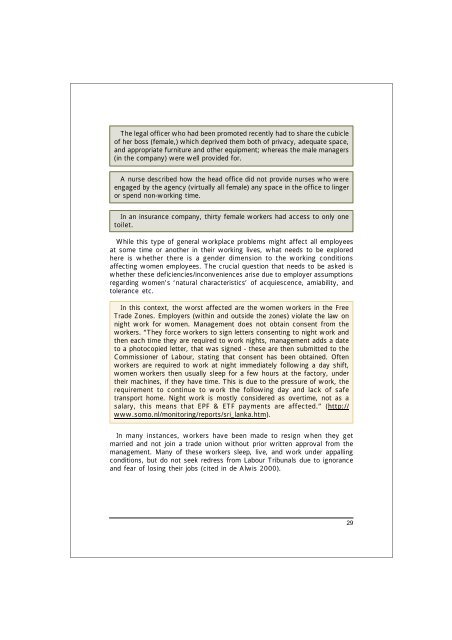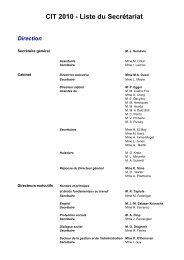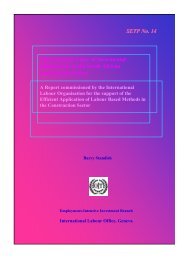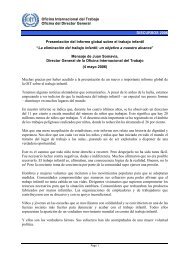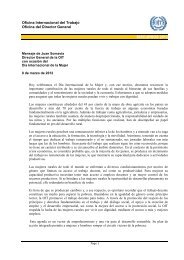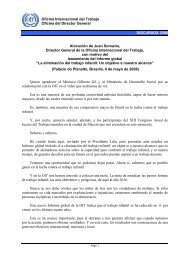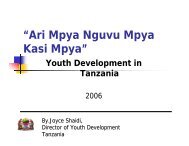Beyond Glass Ceilings and Brick Walls - International Labour ...
Beyond Glass Ceilings and Brick Walls - International Labour ...
Beyond Glass Ceilings and Brick Walls - International Labour ...
Create successful ePaper yourself
Turn your PDF publications into a flip-book with our unique Google optimized e-Paper software.
The legal officer who had been promoted recently had to share the cubicle<br />
of her boss (female,) which deprived them both of privacy, adequate space,<br />
<strong>and</strong> appropriate furniture <strong>and</strong> other equipment; whereas the male managers<br />
(in the company) were well provided for.<br />
A nurse described how the head office did not provide nurses who were<br />
engaged by the agency (virtually all female) any space in the office to linger<br />
or spend non-working time.<br />
In an insurance company, thirty female workers had access to only one<br />
toilet.<br />
While this type of general workplace problems might affect all employees<br />
at some time or another in their working lives, what needs to be explored<br />
here is whether there is a gender dimension to the working conditions<br />
affecting women employees. The crucial question that needs to be asked is<br />
whether these deficiencies/inconveniences arise due to employer assumptions<br />
regarding women’s ‘natural characteristics’ of acquiescence, amiability, <strong>and</strong><br />
tolerance etc.<br />
In this context, the worst affected are the women workers in the Free<br />
Trade Zones. Employers (within <strong>and</strong> outside the zones) violate the law on<br />
night work for women. Management does not obtain consent from the<br />
workers. “They force workers to sign letters consenting to night work <strong>and</strong><br />
then each time they are required to work nights, management adds a date<br />
to a photocopied letter, that was signed - these are then submitted to the<br />
Commissioner of <strong>Labour</strong>, stating that consent has been obtained. Often<br />
workers are required to work at night immediately following a day shift,<br />
women workers then usually sleep for a few hours at the factory, under<br />
their machines, if they have time. This is due to the pressure of work, the<br />
requirement to continue to work the following day <strong>and</strong> lack of safe<br />
transport home. Night work is mostly considered as overtime, not as a<br />
salary, this means that EPF & ETF payments are affected.” (http://<br />
www.somo.nl/monitoring/reports/sri_lanka.htm).<br />
In many instances, workers have been made to resign when they get<br />
married <strong>and</strong> not join a trade union without prior written approval from the<br />
management. Many of these workers sleep, live, <strong>and</strong> work under appalling<br />
conditions, but do not seek redress from <strong>Labour</strong> Tribunals due to ignorance<br />
<strong>and</strong> fear of losing their jobs (cited in de Alwis 2000).<br />
29


